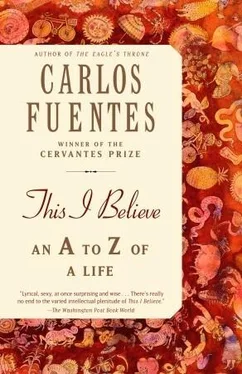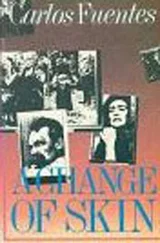The temple of ethics is erected so that human experience may be, though difficult, exceptionally constructive. As far as I can see, this requires a high degree of attention that surpasses our own selves, our own interests, and focuses its concerns on the needs of others, linking our internal subjectivity to the world’s objectivity through the one thing that the self and the world share: community. The nos-otros, the “we,” us with others. And if this is a variant of the Kantian imperative, so be it. Kant may very well be the last thinker able to be fully moral before history (Nietzsche) proved that history was only very rarely in harmony with either goodness or happiness.
Given that we remain decrepit, ruined prisoners of the last great cultural revolution, which was Romanticism, this kind of skepticism has led us to believe fervently in the experience of passion, to the degree that we cannot conceive of experience without passion. Corazón apasionado (impassioned heart), as the old Mexican song goes. Passion means recognizing, respecting, and emulating the greatness of human emotion, to the degree of believing that passions themselves are what constitute the human soul. The experience of passion attempts to conceive of itself as a kind of free obedience to valid existential impulses. In my novel The Years with Laura Díaz , I describe a passion that encompasses the surrender and reserve necessary for passionate ecstasy to be truly consummated.
At the entrance to the house, he was reserved, discreet. . On the second floor he was surrendered, open, as if the exclusion had been the sole thing that had placed him exposed to the elements, with no reserve whatsoever for the time of love. He couldn’t resist the idea of that combination, a complete manner of being a man, serene and passionate, open and secret, discreet when dressed, indiscreet when nude. . There he was, finally, as he always had been or invented right then, but revealing an eternal desire. .
To have desires and to know how to sustain them, correct them, abandon them. . what is the path of this experiential ideal? It is precisely that very delicate balance between the moment that is active and the moment that is patient. All we need to do is observe (not imagine, but rather observe and confirm through the images and news we see on a daily basis) the manner in which passion degenerates into violence. This is what leads us to advocate a kind of balance that does not condemn passion (which is, after all, the source of such great satisfaction) but emerges from patience — not the patience of Job but rather the patience of resistance: the moral courage of Socrates, of Bruno, of Galileo, of Akhmatova and Mandelstam, of Edith Stein and Simone Weil, of all the humiliated and vilified souls of the City of Man, of all the patient pilgrims making their way to the City of God.
The concept of waiting is inextricably linked to attention. It is not resignation. It is not the terrible impatience of the Catholic confessional, where we ruin our experiences by revealing them to a man who can be just as perverted as the instructions the Church gave its confessors in the Spanish colonies (“Little girl, have you ever looked at yourself naked in a mirror? Have you ever desired your father’s member?”); as indifferent as the sleepy parish priests who dispense Our Fathers and Hail Marys; or as solicitous — this is also true — as the exceptional priest who invokes the voice of confession to separate it from parlor fodder and make it the object of communion — of, I repeat, a shared attention.
The heart of all experience, more than anything, is the simple awareness that all experience is limited. And not only because we, like Pascal, are gripped by the vertigo of infinite spaces, but because death (if not life) and the gaze of the night (if not the blindness of the day) tell us that experience is limited and the universe, infinite. This is proven to us by the fact that no experience, no matter how good or valuable it may be, is ever completely fulfilled. The artist, who need not possess the chisel of Michelangelo to ensure the imperfection of his work, knows this. If the work of art were perfect, it would be divine, impenetrable, holy. Death will tell us the same thing about experience. Socrates and Greta Garbo are dead. The philosopher will never dialogue again, nor will any more of his thoughts emerge beyond the ones established by Plato. All the rest (which does not mean the “lesser”) — memory, humor, prudence, hope, physical and psychical reality — have left us forever. Greta Garbo has always looked at us and will always gaze upon us as Queen Christina, from the prow of the ship that delivers her far from love and toward impassioned memory. But Greta Gustafsson will never make another movie. Yes, a passionate heart, but one that conceals a sadness within. And he who is born into misfortune embarks upon a life of pain and suffering, right from the cradle, the Mexican song continues.
Reckless courage is what a person needs to be able to endure a limitless experience, one that is exposed to all kinds of risk. Goethe, typically, asked us to search for the infinite within our own selves: “And if you do not find it in yourself and in your thoughts, there will be no mercy for you.” But there is an awareness of the limits, one that the young, romantic author of The Sorrows of Young Werther skillfully balanced with the morality and aesthetics of Wilhelm Meister. Everything has a limit and the real challenge to our liberty lies in the question: do we dare to exceed those limits or do we not? The answer is yet another challenge. If we wish to broaden the area of our experience, we must understand the limitations of that experience. Not the political, psychological, or ethical limitations, but rather the limitations inherent to all experiences simply because of their nature as experiences. Each person possesses his own personal device for gauging those limitations. Einstein did not exceed his own limitations. Hitler did.
A character from the novel The Years with Laura Díaz expresses a desire to be in a place where he feels exposed to danger and at the same time protected, not because he wants to banish the feeling of being in danger but because he does not want to let himself be fooled by the illusion of his own power. How many people do we know who take extraordinary pains to appear strong for those around them precisely because they are all too aware of their interior weaknesses? Who will win that duel with weakness by making themselves strong on the inside, so that the world does not deceive them with false strength, crumbs of power, or insulting pity? Stoic resistance should be taken seriously because, as Marcus Aurelius tells us, we are never given more than we can endure. And he adds: “Time is a sort of river of passing events, and strong is its current; no sooner is a thing brought to sight than it is swept by and another takes its place, and this too will be swept away. . ”
To understand this quotation you do not need great moral courage, but to experience it you most certainly do. “Was it for this. .?” asks Wordsworth at the beginning of The Prelude, one of the greatest poems of all time. And he answers with yet another question: “For this. .?” Behind both questions, the fabric of our experience is being woven like a second skin, made up of the abilities that we gradually acquire as humans. The ability to be with others, and the experience of solitude as well. Forms that detach from our personal experiences and take on lives of their own, leaving testimony behind, perhaps fleeting, perhaps permanent, of our passage. And of our passion. Lights that progressively illuminate our path. And the nagging question: what are the names of those beacons that light the way for us? The skin of experience. With scars that sometimes heal and sometimes do not. The voice of experience. Sometimes we listen to it, sometimes we do not. Experience: danger and yearning. Experience and desire: an ardent or serene anticipation of something that has yet to happen, without losing sight of those things that already have happened.
Читать дальше












